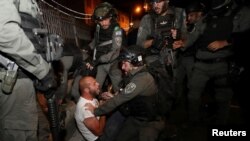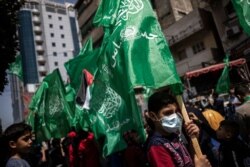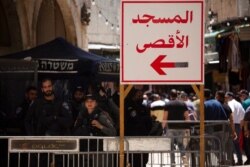Israeli police say 44 people were arrested and 20 officers were wounded in a night of chaos in Jerusalem, where security forces separately clashed with Palestinians angry about Ramadan restrictions and Jewish extremists who held an anti-Arab march nearby.
Tensions have spiked in recent days in Jerusalem, which has long been a flashpoint in the Israeli-Palestinian conflict and is home to holy sites sacred to Jews, Christians and Muslims. Residents braced for possible further unrest as police stepped up security and the U.S. Embassy appealed for calm.
In what seemed a retaliation for the incidents in Jerusalem, Palestinian militants in the Gaza Strip fired three rockets toward Israel late Friday. The Israeli military said two rockets fell near Gaza frontier and the third was intercepted by Israeli air defenses. No Palestinian group claimed responsibility for the attack, which came hours after Hamas' armed wing warned Israel "not to test" its patience.
There were concerns the violence could reignite following Friday prayers at a major holy site in Jerusalem, but thousands of worshippers dispersed peacefully after Muslim religious leaders called for restraint. The Islamic militant group Hamas meanwhile staged demonstrations across Gaza reiterating its support for armed struggle.
But late Friday, dozens of Palestinians marched toward an entrance to the walled Old City of Jerusalem and clashed with Israeli police, which said the protesters had thrown stones and other items at officers. Six Palestinians were injured with two hospitalized.
Palestinians have clashed with Israeli police nightly since the start of the Muslim holy month of Ramadan. The tensions began when police placed barricades outside the Old City's Damascus Gate, where Muslims traditionally gather to enjoy the evening after the daytime fast.
Late Thursday, hundreds of Palestinians hurled stones and bottles at police, who fired a water cannon and stun grenades to disperse them. Dozens of Palestinians were wounded in the melee.
Meanwhile, a far-right Jewish group known as Lahava led a march of hundreds of protesters chanting "Arabs get out!" toward the Damascus Gate. The show of force came in response to videos circulated on TikTok showing Palestinians slapping religious Jews at random. Other videos made in response to them appear to show Jews assaulting Arabs.
Police use barricades, water cannons
Police used metal barricades to halt the far-right protesters a few hundred meters from Damascus Gate. Later, they used water cannons, stun grenades and mounted police to push them back toward mostly Jewish west Jerusalem.
Videos circulated online showed smaller clashes and fires elsewhere in the city. One video showed what appeared to be a group of Palestinians beating an ultra-Orthodox Jew near Damascus Gate. They could be seen punching, kicking and throwing him to the ground before police chased them off.
The police statement did not specify whether those arrested were Palestinian or Jewish and did not refer to any specific instances of violence. The police did not immediately respond to a request for more details.
Israel captured east Jerusalem in the 1967 war and annexed it in a move not recognized by most of the international community. The Palestinians want east Jerusalem to be the capital of their future state. Its fate has been one of the most divisive issues in the peace process, which ground to a halt more than a decade ago.
The U.S. Embassy said it was "deeply concerned" about the violence in recent days.
"We hope all responsible voices will promote an end to incitement, a return to calm, and respect for the safety and dignity of everyone in Jerusalem," it said in a statement.
Tens of thousands of Palestinians attended weekly prayers at the Al-Aqsa mosque compound in Jerusalem's Old City on Friday. The site is the third holiest in Islam and the holiest for Jews, who refer to it as the Temple Mount.
Sheikh Muhammad Hussein, the Grand Mufti of Jerusalem, condemned the "police and settlers' attack on Palestinians in Jerusalem" in his Friday sermon. But he called on worshippers to remain calm and not to give the other side an excuse to storm the compound. They dispersed peacefully after prayers and there were no immediate reports of unrest.
The sprawling hilltop compound has seen clashes several times over the years and was the epicenter of the 2000 Palestinian intifada, or uprising.
Protests by Hamas
Hamas, which rules the Gaza Strip, meanwhile staged dozens of protests across the territory expressing solidarity with Muslim worshippers in Jerusalem.
Addressing the protesters, senior Hamas leader Mahmoud Zahar condemned the decision of some Arab states to normalize relations with Israel last year and lashed out at the Palestinian Authority in the occupied West Bank for continuing its security coordination with Israel.
"After a long series of protests and demonstrations, we have reached the conclusion that without weapons, we cannot liberate our land, protect our holy sites, bring back our people to their land or maintain our dignity," he said.











